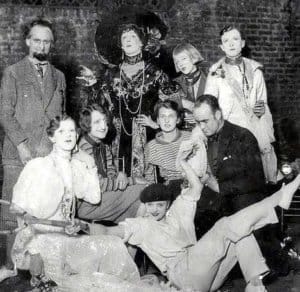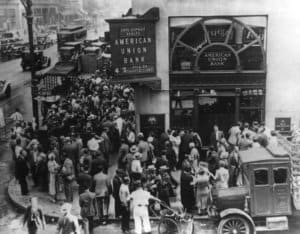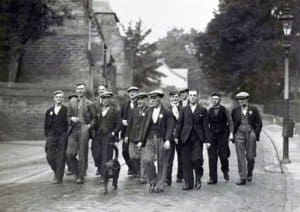what did britain do in response to the great depression quizlet
On Tuesday 29th October 1929 the Wall Street Crash caused a cataclysmic chain of events which affected nearly every country across the globe. The Neat Low, besides known as 'The Slump' infiltrated every corner of gild, affecting people'south lives betwixt 1929 and 1939 and beyond. In Britain, the impact was enormous and led some to refer to this dire economical fourth dimension every bit the 'devil's decade'.
This economic depression occurred equally a direct result of the impact of a stock market crash on Wall Street in October 1929. The American economy in the 1920'south was capitalising on the post-war optimism, leading many rural Americans to try their luck in the large cities with the hope of prosperity and wealth. 'The Roaring Twenties' every bit it was known was experiencing a boom in the industrial sector, life was good, money was flowing and backlog and opulence was the name of the game, characterised past fictional figures such as 'The Corking Gatsby'.
 'Bright Young Things'
'Bright Young Things'
Unfortunately, the prosperity experienced in the big American cities was not replicated in the rural communities, mainly due to overproduction in agriculture which acquired financial difficulty for American farmers throughout the 'Roaring Twenties'. This would end up being one of the key reasons for the subsequent financial crash.
In the meantime, back in the 'big smoke' people began to play the stock exchange and the banks were using people'south own personal savings to increase profits. Speculation was rife with people jumping onto the fever of economic optimism that was sweeping the nation.
Industry ranging from fe and steel, structure, automobiles and retail was booming in the 1920's, leading more and more Americans to invest in the stock market. This led to an enormous increase in borrowing in gild to purchase the stock in the first place. Past late 1929, this borrowing and ownership bicycle was out of control, with lenders giving upwardly to two thirds more the value of the bodily stock; by this time around $8.5 billion dollars was on loan. This effigy was significantly larger than the amount of money actually circulating in the land at the time.
By 1929 the buying and borrowing cycle proved also much and the returns on the share prices began to fall. The immediate reaction was for many to start selling their shares. Earlier too long, this collective sense of panic led to large scale withdrawal: people were subsequently forced into an untenable state of affairs, unable to repay loans. The economy was teetering on the edge and it was merely a affair of time until it fell into economical freefall. In 1929, this is exactly what happened.
 Run on New York's American Spousal relationship Banking concern. The Bank went out of business on June 30th 1931.
Run on New York's American Spousal relationship Banking concern. The Bank went out of business on June 30th 1931.
The Great Low started in the United States causing an enormous reduction in the worldwide gross domestic product, which fell in the flow from 1929 to 1932 past fifteen percent. The bear upon was widespread and the most astringent depression ever experienced in the western world, causing loftier levels of unemployment for years afterwards. Information technology proved to be non only an economic ending but also a social ane.
The American crash caused a domino effect, encapsulating widespread financial panic, misjudged authorities policy and decline in consumerism. The golden standard which was inextricably linked to most countries beyond the world through the fixed exchange rates helped to transmit the crisis to other countries. In order to deal with such a crisis, big changes in economic policy and management needed to be introduced.
For Britain and Europe the fallout was all-encompassing; with the American markets taking the hit, the demand for European exports declined. This ultimately had the effect of reducing European output which resulted in big scale unemployment. Another major bear on of the downturn was based upon the lending which had been taking identify for years. The American lenders responded by recalling their loans and American capital, leaving Europeans with their own currency crunch. One of the most obvious solutions, as adopted by Britain in 1931, was to exit the Golden Standard.
Britain was functioning as a major exporting land and so when the crunch hit, the land was badly afflicted. In the starting time few years afterwards the crash, British exports fell by half which had a disastrous effect on employment levels. The numbers of unemployed in the years that followed was astronomical, ascension to around two.75 million people, many of whom were not insured. The high levels of unemployment and lack of concern opportunities were not equally felt across Britain, with some areas escaping the worst of it, whilst at the same time others suffered terribly.
 Jarrow marchers
Jarrow marchers
Industrial areas such every bit southern Wales, the northward-east of England and parts of Scotland were greatly affected due to the staple industries of coal, atomic number 26, steel and shipbuilding experiencing the worst of the economical hit. Jobs later suffered and the areas which had flourished in the industrial revolution were at present suffering badly.
The number of unemployed had reached the millions and the impact for many was starvation. Men were left unable to provide for their families and many resorted to queuing at soup kitchens. This was recorded past a government study, highlighting that around a quarter of the British population were barely existing on a poor subsistence nutrition. The result was increased cases of kid malnutrition resulting in scurvy, rickets and tuberculosis. The economic crisis had turned into a social one. The authorities needed to act fast.
In 1930 a pocket-sized ministerial team was formed to tackle the most pressing issue, that of unemployment. This was led by J.H Thomas who was a leading figure in the railway marriage, equally well as George Lansbury and the infamous character Oswald Mosley (the man who established Britain's Fascist Party). In this period, government spending had gone through the roof; for Mosley, the policy-making was likewise boring and he presented his own programme called the Mosley Memorandum. This was after rejected.
Moderates, including MacDonald and Snowden had enormous disharmonize with the more radical proposals put forward, and eventually a fifteen fellow member Economical Advisory Quango was introduced. This was formed of industrialists and economists such as the famous Keynes, who would collectively come with more creative solutions to the current crisis. In the meantime, the regime was declining to win back up and seemed doomed to fail at the next General Election.
Meanwhile, in Europe the banks began to collapse under the economic strain, leading to further British losses. For British politicians, spending cuts seemed similar the natural solution and in July 1931 the May Commission, upon reporting a deficit amounting to around £120 million, made the proposition of a twenty percent decrease in unemployment benefit. A political solution for some only for those living below the poverty line, hunger and penury beckoned.
A 'run on the pound' led to a major withdrawal of funds and investment from foreign sources who were fearing the worst. This led to almost one quarter of the Depository financial institution of England's gilded reserves being used. The situation looked more than ominous with the Cabinet still split on issues relating to public spending. Past 23rd August, despite his success in winning the vote to cut back on public spending, MacDonald resigned and the post-obit 24-hour interval a National Regime was formed.
 Ramsay MacDonald
Ramsay MacDonald
A month later elections were held, resulting in a Conservative landslide victory. The Labour Political party, with xl-half-dozen seats, was desperately damaged past the mismanagement of the crunch and despite MacDonald continuing as Prime Government minister in 1935, the era was now politically dominated by the Conservatives.
Britain in late 1931 began a slow recovery from the crisis, partly prompted by its withdrawal from the Gold Standard and devaluation of the pound. Interest rates were too reduced and British exports were starting to appear more competitive on the global market. Information technology would not be until several years later that the affect on unemployment finally began to have effect.
In the southward, recovery occurred sooner, largely as a upshot of a strong structure industry with booming levels of business firm product aiding the recovery. For the worst affected areas, the progress would be much slower, despite government attempts at reforming and developing the areas with loans to shipyards and road edifice projects.
The Nifty Depression continued to wreak havoc on many people's lives beyond the globe and what had started as a decade of economic optimism concluded with widespread financial ruin and despair. The Great Low infiltrated the lives of a generation and those beyond it, with tough lessons needing to be learnt. Information technology remains one of the nigh pivotal moments of economic history, as a warning to all, never let it happen once again.
Jessica Brain is a freelance writer specialising in history. Based in Kent and a lover of all things historical.
Source: https://www.historic-uk.com/HistoryUK/HistoryofBritain/Great-Depression/
0 Response to "what did britain do in response to the great depression quizlet"
Post a Comment